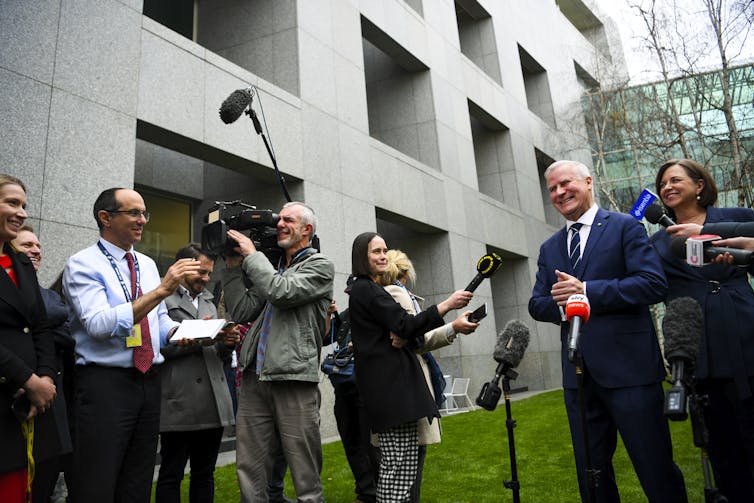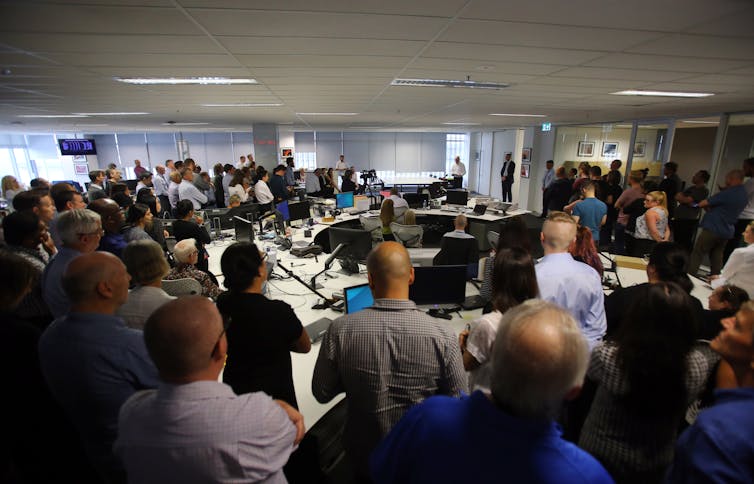Australia's media industry shed 5,000 journalists to survive – what does this mean for those who left, and those left behind?
- Written by Matthew Ricketson, Professor of Communication, Deakin University
In the 2000s, the internet shredded the media’s business model. The media’s influence fragmented and many employees paid the price.
Between 2012 and 2016, thousands of Australian journalists lost their jobs in large redundancy rounds as the industry scrambled to try to stay alive. The bulk of redundancies happened in print media because historically, they employed the largest number of journalists.
The disruption to traditional business models – and the rush to find a new one — has been much discussed from a financial perspective. But what about the journalists who left the industry or those left behind in stripped-down newsrooms?
Disrupted lives
The Media Entertainment and Arts Alliance (the journalist’s union) estimates up to 5,000[1] Australian journalists have left the industry over the past decade.
The New Beats[2] study has been charting what happened to journalists after they left, including through regular surveys. In partnership with the National Library of Australia, we have also conducted “whole-of-life” interviews with close to 60 journalists for the library’s oral history collection.
 Senior journalists provide younger colleagues with story ideas, phone numbers and essential advice.
Lukas Coch/ AAP
Senior journalists provide younger colleagues with story ideas, phone numbers and essential advice.
Lukas Coch/ AAP
Some of them are well known — David Marr for example — while others worked behind the scenes as sub-editors. A minority of them soon found another job in the mainstream media, while some used their redundancy packages to fund projects to reinvent journalism. Others went to the so-called dark side of public relations while others left the media altogether.
Our new book[3], Upheaval: Disrupted Lives in Journalism, tells their story. It aims to give a picture of what it was like to work in journalism when the media had resources and a lot of influence and then what happened as disruption began in earnest during the mid-2000s.
The cost of cost-cutting
Along with redundancies, annual intakes of trainees or cadets (where young journalists are not only hired but trained) were at best paused, at worst stopped. Sub-editing was outsourced to standalone production companies like Pagemasters or cut to skeletal levels.
It is hard to see immediately how this affects the journalism that continues to be produced every day — although glaring typographical errors or headline bloopers are visible to the naked eye. Less visible is the loss of informal mentoring and advice provided by senior journalists, admittedly often expressed with back-of-the-axe bluntness!
Read more: Australians are not aware news outlets are in financial trouble: new report[4]
Senior journalists were the ones encouraged to take redundancies because they were on higher salaries. In the first New Beats survey, conducted in 2014, 54% of respondents were aged 51 and over.
This is a huge loss of knowledge and experience. Senior journalists would often provide contact details for useful sources or remind younger colleagues what the prime minister had said abut the topic at hand five years ago. They would warn less experienced colleagues about legal or ethical minefields and help them find the strongest news lead.
What this meant was fewer journalists and less experience in newsrooms but greater demands to produce stories across print, audio, video, online and social media.
The quality of journalism today compared to a decade ago was not the focus of our study. What is hard to measure but vitally important is the absence of stories that might have been covered once but aren’t now. The public can’t know what it isn’t told.
Informal mentors
One of our interviewees, Guardian investigative reporter Anne Davies, recalled how as a young journalist at the Australian Financial Review, she got a tip law firm, Freehills, was about to merge with another legal practice. She told her chief of staff she might have a story. “Come on, sit next to me”, he said, and they wrote it together.
Glenn Dyer really looked after the cadets […] he’d walk in and he’d go, ‘Davies, I want you to follow up. It’s on page four of The Australian’ […] he got us really charged up about the thrill of the chase.
Veteran journalist and author George Megalogenis also benefited from mentoring, but in a less direct way. At Melbourne’s Sun newspaper, cadets like him were seated at the top of the sub-editors’ table, one chair away from the editor-in-chief. They were encouraged to learn through osmosis.
You got to see news judgements made every night […] I spent a lot of time eavesdropping.
The New Beats’ annual survey in 2017 highlighted the decline of informal mentoring and lack of experience in newsrooms. As one respondent, by then a retired 66-year-old, said:
The lack of corporate knowledge and mentoring have already been damaged, possibly beyond repair. Older experienced minds have been replaced with younger and cheaper folks. No criticism of them. We were all like them at some stage and fed off the experience of others. I can still name my mentors and carry many of their ideas with me.
What’s the solution?
Who, if anyone, is replacing these informal mentors? There are still some experienced hands in the news media and the ability of younger journalists to adapt and learn should not be underestimated.
There is anecdotal evidence among journalism academics that recent graduates working in newsrooms are reaching out to them for guidance as they struggle to deal with the difficulties of covering COVID-19, including hyper-scrutiny of their work, and of abuse and trolling on social media. The Media Entertainment and Arts Alliance provides regular workshops for members on various aspects of journalistic work.
 Senior journalists, on higher salaries, have been more likely to take redundancies.
Stephen Saphore/AAP
Senior journalists, on higher salaries, have been more likely to take redundancies.
Stephen Saphore/AAP
The union and journalism lecturers can provide support and assistance but reporting the news is a fast-paced job that throws up knotty issues amid great pressure that need to be resolved immediately.
By interviewing journalists who experienced redundancy, we learned many still care deeply about the craft of reporting. Collectively they are a repository of what Aristotle called practical wisdom.
We captured some of that wisdom, and at times could hear one generation of journalists talking to the next. They were encouraging and cautioning and emboldening, while also being aware of the pressures making journalism harder nowadays. There is an enduring need for this kind of intergenerational learning.
There is also a challenge for those managing now-reduced newsrooms to find ways to do this. Those former journalists may no longer be sitting across the partition but they are still ready and able to share their knowledge when, and if, they’re asked.
Read more: Media Files: Australians' trust in news media is falling as concern over 'fake news' grows[5]
References
- ^ estimates up to 5,000 (www.meaa.org)
- ^ New Beats (www.newbeatsblog.com)
- ^ new book (www.newsouthbooks.com.au)
- ^ Australians are not aware news outlets are in financial trouble: new report (theconversation.com)
- ^ Media Files: Australians' trust in news media is falling as concern over 'fake news' grows (theconversation.com)

















